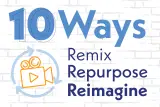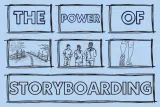5 Ways to Use Video in Healthcare Marketing (+Tips to Maximize Effectiveness)
General
 Posted by: DreamOn Studios 12 months ago
Posted by: DreamOn Studios 12 months ago
Here in Warsaw, Indiana, DreamOn Studios is surrounded by some of the most innovative minds in MedTech and healthcare. In fact, with such a high concentration of orthopedic manufacturers, research institutions, and medical professionals, Warsaw is considered the orthopedic capital of the world!
Being part of this amazing community, it’s no wonder that our healthcare clients are among some of our favorite partners to work with, including our friends at Plug and Play and Network Partners Group.
Unlike our other clients in the business or nonprofit space, professionals in healthcare have a unique set of challenges, particularly when it comes to video marketing.
Some of the factors they must consider when it comes to healthcare marketing include:
- Regulatory compliance—to protect patients and ensure accuracy
- Emphasis on credibility—to promote competence and ensure safety
- Multiple stakeholders—to deliver accurate information for all parties involved
- Ethics—to promote services without exploiting patients’ fears
- Education—to help patients and providers make well-informed decisions
- Digital health solutions—to address new ways of delivering support
These factors require healthcare marketers to adopt sensitive, informed, and patient-focused strategies. To do that well, DreamOn Studios partners with healthcare leaders through video production focused on elevating their online presence, improving patient engagement, clarifying important information, and building trust and credibility.
In this article, we’ll look at what video marketing is, how it can boost healthcare marketing and tips to maximize its effectiveness.
First off, let’s talk about video marketing. It’s not just a buzzword—it can be the red carpet that your brand walks on.
Picture this: videos that capture the pulse of your operation, brand story videos that share your journey like a gripping documentary, and explainer videos that simplify the complex. It’s not just about producing videos—it’s about premiering stories that captivate, educate, and resonate.
What is Video Marketing?
Video marketing refers to the use of video to promote a brand, product, or service. It involves creating and distributing videos across different online platforms, such as social media channels, websites, and video-sharing sites like YouTube, to engage with potential customers and drive marketing objectives.
Video marketing can take various forms, including:
- Live videos
- Brand videos
- Product videos
- Explainer videos
- Testimonial videos
- Educational videos
Some of the most effective video marketing strategies involve optimizing videos for various platforms, incorporating calls-to-action, leveraging influencer marketing, and integrating videos into broader content marketing campaigns.
When it comes to video marketing for the healthcare industry, many of the same principles in traditional marketing still apply. However, there may be nuance, especially regarding regulatory compliance, patient safety, and the need to communicate with various stakeholders (insurance companies, providers, patients, caregivers, and families).
Now, let’s dive into the different ways video can boost healthcare marketing!
5 Ways to Use Video in Healthcare Marketing
#1 Elevate Brand Presence
Think of your brand video as the blockbuster movie of the year. Your mission? The plot. Your values? The characters. Your vision? The unforgettable ending. When healthcare companies incorporate video into their marketing strategy, specifically on their website and social media platforms, they can increase engagement.
For example, not only does video increase an average visitor’s time on a website, but it also boosts conversion rates and traffic. Videos are also found to increase engagement and reach on social media while improving brand awareness and building trust.
Here are some specific video types that can elevate your online presence in healthcare marketing:
- Brand video: Videos highlighting the healthcare organization’s mission, vision, and values help showcase its purpose and position itself as a preferred provider in their field.
- Community outreach and charitable initiatives: Videos highlighting involvement in community outreach programs, charitable initiatives, or awareness campaigns help showcase commitment to the community’s well-being. These videos can foster a sense of trust and goodwill, positioning the organization as a socially responsible and caring partner in the community’s health.
In this example from our client, Plug and Play, you can see how they used a fun sizzle reel to showcase their brand’s values.
#2 Improve Patient Engagement
Who said healthcare has to be all about pamphlets? When healthcare companies incorporate video into their marketing and communication strategy, they help make impersonal information more approachable.
One study found that patients who watched educational videos were more likely to initiate a discussion with their healthcare provider. This means that video can improve the likelihood that someone gets the care they need!
Here are some specific video types that can improve patient engagement (and improve people’s health overall!):
- Hot topic social media reels: Videos can engage people online around trending topics, procedures, and equipment people may have seen on popular TV shows or movies. By creating short-form videos designed for social media, healthcare companies can engage their audience where they’re already consuming content, allowing people to receive accurate information while engaging and sharing it with their friends and family.
- Interactive Q&A sessions: Healthcare organizations can host live video sessions or post pre-recorded Q&A videos where patients can submit their questions and medical professionals can provide expert answers. This interactive format allows patients to actively engage with the healthcare providers, clarify their doubts, and better understand their health concerns.
- Personalized video messaging: Healthcare organizations can use video messaging to communicate personalized care instructions, appointment reminders, or follow-up information to patients. These customized videos can improve patient engagement by providing a more human and engaging experience, increasing the likelihood of patients following recommended care plans.
- Health and wellness education: Healthcare organizations can create videos that promote healthy lifestyle choices, such as proper nutrition, exercise routines, and stress management techniques. These videos can use relatable examples, expert advice, and visually appealing demonstrations to make health and wellness information more engaging and easier to follow.
#3 Clarify Important Information
There’s nothing like the anxiety of not understanding what’s going on with your body or what’s going to happen during that one test you can hardly pronounce!
Video is a great way to educate patients about their health and set expectations about procedures, equipment, or medicine. One study found that video-based education led to a 57% improvement in medication adherence!
Here are some examples of how video can help clarify important information:
- Explaining medical procedures and treatments: Healthcare organizations can create videos that provide detailed explanations of various medical procedures, surgeries, or treatments. These videos can use animations, diagrams, and expert narration to break down complex processes into easily understandable steps. For example, a hospital could create a video explaining the process of a knee replacement surgery, from pre-operative preparations to post-operative care, helping patients understand what to expect and reducing anxiety.
- Medication instructions and side effects: Videos can be used to provide clear instructions on how to properly take medications, including dosage, timing, and potential side effects. These videos can benefit patients with chronic conditions or those taking multiple medications. A pharmacy or pharmaceutical company could create videos explaining the correct usage, ensuring patients thoroughly understand their prescriptions.
- Condition-specific education: Healthcare organizations can develop a video series focusing on specific medical conditions, such as diabetes, cancer, or heart disease. These videos can provide comprehensive information on each condition’s causes, symptoms, risk factors, and management strategies, using visual aids, animations, and expert interviews to make complex information easier to understand.
- Post-operative care instructions: After a surgical procedure, patients often receive a significant amount of information regarding post-operative care. Video instructions can help reinforce and clarify these critical details, ensuring patients clearly understand the recovery process and reducing the likelihood of complications.
#4 Builds Trust & Credibility
Where do most consumers go before making a big decision? That’s right—reviews! Video marketing is an effective tool to build trust and credibility with patients and the broader community, especially when hearing from real people.
Whether consumers are looking for reviews from authentic sources or curious about the staff behind the organization, a human-centric, authentic approach is a winning strategy enhanced with video.
Here are some examples of how video marketing can build trust and credibility:
- Testimonials and success stories: Video testimonials from satisfied patients can be powerful marketing tools, as they offer authentic and relatable accounts of the services and quality of care. These videos can help build trust and credibility among potential patients. For example, a rehabilitation center could feature videos of former patients sharing their recovery journeys and the positive impact of the center’s services.
- Physician and staff introductions: Videos introducing the healthcare organization’s physicians, specialists, and staff can help establish trust and familiarity with patients. These videos can showcase the healthcare providers’ expertise, qualifications, values, and personalities, making patients feel more comfortable and connected with the organization.
- Behind-the-scenes glimpses: Videos that provide a look at the healthcare organization’s facilities, cutting-edge technology, and advanced treatment methods can help showcase the organization’s commitment to providing high-quality care. These videos can highlight the organization’s dedication to staying at the forefront of medical advancements, inspiring confidence in their capabilities. For example, a cancer treatment center could create a video showcasing its state-of-the-art radiation therapy equipment and the highly trained staff operating it.
- Expert interviews and panel discussions: Videos featuring interviews with the organization’s medical experts, guest speakers, or panel discussions on relevant healthcare topics can showcase the organization’s depth of knowledge and expertise. These videos can help establish the organization as a credible and authoritative source of medical information, building trust among viewers.
In this example from our client, Network Partners Group, you can see how they used fireside chats to be more personable with their audience.
#5 Promotes Patient Confidence
Video marketing also helps provide transparency, education, and reassurance. As more consumers look to YouTube and other social sites for informative content about their healthcare questions, video marketing effectively promotes patient confidence.
Here are some examples of how video marketing can help build patient confidence:
- Procedure walkthroughs: Videos can provide detailed walkthroughs of various medical procedures, surgeries, or treatments offered by the healthcare organization. These videos can help demystify complex processes, alleviate patients’ anxieties, and promote confidence by giving them a clear understanding of what to expect during their treatment journey.
- Patient support resources: Videos can showcase or offer support resources and services, such as counseling, support groups, or wellness programs. By highlighting these resources, patients can feel more confident that they will receive comprehensive care and support throughout their healthcare journey, promoting a sense of reassurance and confidence in the organization.
- Virtual consultations: Healthcare organizations can offer virtual consultations or live Q&A sessions through video platforms, allowing patients to interact directly with medical professionals and address their questions and concerns in real time. This level of transparency and accessibility can foster patient confidence by providing direct communication with healthcare experts.
Top 3 Tips to Maximize Video Marketing
#1 Focus on Storytelling
People are drawn to stories! So, create videos that tell stories that engage with people emotionally. Even complex medical equipment can tell a story. Ultimately, medical care is about caring for humans, and behind every human is a story!
To incorporate stories into your marketing strategy, follow these strategies:
- Feature actual patients, healthcare professionals, or caregivers.
- Share personal experiences, challenges, and triumphs to empathize with your audience.
- Highlight stories of resilience, compassion, and innovative treatments.
- Showcase how your healthcare organization has positively impacted the lives of patients, families, and communities.
- Address a pain point, identify a problem or conflict, and share a promise or resolution.
- Weave in your organization’s mission, vision, and commitment to care.
#2 Utilize the Power of SEO
SEO (Search Engine Optimization) is the practice of optimizing websites and webpages to rank higher in search engine results pages (SERPs) for specific keywords or phrases related to the website’s content or offerings.
The goal of SEO is to increase the visibility and organic (non-paid) traffic to a website from search engines like Google, Bing, and Yahoo.
To maximize the power of SEO in your video marketing, incorporate these strategies:
- Use relevant keywords in your video titles and descriptions.
- When uploading your videos to hosting platforms, include appropriate metadata, such as titles, descriptions, tags, and categories.
- Share your videos on social media platforms and encourage others to link to your content.
- Collaborate with influencers or industry experts to create and promote content, potentially earning backlinks.
- Generate and submit a video sitemap to search engines, allowing them to discover and index your video content.
#3 Monitor Analytics to Refine Strategies
To make the most of your video marketing, it’s essential to analyze what’s working and what’s not while adapting to new trends.
To get the most significant ROI, incorporate these strategies:
- Track viewer engagement, including view-through rates, drop-off rates, and watch times, then identify which video topics and formats are most engaging.
- Measure conversion rates and lead generation, including form submissions, bookings, or purchases.
- Utilize data to understand audience demographics and trends, and tailor your videos for more relevant content.
- Focus your video distribution on channels where your videos generate the most traffic and engagement.
- Track mentions, shares, and comments to gauge brand awareness and sentiment, then use the feedback to create clarity or address concerns.
Conclusion: Video is a transformative tool in healthcare marketing!
Leveraging video in healthcare marketing is not just about staying ahead in the digital game—it’s about connecting with patients and the community in meaningful ways. From elevating your online presence and improving patient engagement to educating the public and promoting digital health solutions, the power of video cannot be underestimated.
At DreamOn Studios, we understand the unique challenges and opportunities within the healthcare sector, especially in a MedTech hub like Warsaw, Indiana.
We are committed to partnering with healthcare professionals like you to craft video content that meets regulatory standards and resonates with patients and providers alike while building trust and credibility.
With the right strategy and creative execution, video can be a transformative tool for healthcare marketing, bringing services to life and making a real difference in people’s lives!
Are you a leader in healthcare ready to experience what video marketing can do for you?
The DreamOn team would love to connect with you. Schedule a free discovery call today!
You May Be Interested In:

5 Ways to Make Short-Form Video Content Work for Your Business
9 months ago by DreamOn Studios

10 Ways to Remix, Repurpose, & Reimagine Your Video
11 months ago by DreamOn Studios

Storyboarding Benefits, Tips & Tricks for Stand Out Videos
1 year ago by DreamOn Studios

7 Video Types: Which is Right for Your Brand and Marketing Strategy?
1 year ago by DreamOn Studios